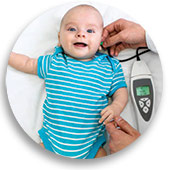
Late Onset Hearing Loss is when a child develops a hearing loss sometime after birth. Your child may pass their hearing screening at birth, and then develop hearing loss later in life. It is important that your child continues to receive hearing screenings annually through their preschool years.
What can lead to late onset hearing loss?
- Family history of children with hearing loss
- Unusual formation of the ears or face
- Head injury that requires medical attention
- Ear infections with fluid that last more than four months
- Child spent five days or more in neonatal intensive care (NICU)
- A neurological disorder
- Exposure to infection before birth
- An infection around the brain and spinal cord (bacterial meningitis)
- Jaundice severe enough to need special treatment
What are the signs of hearing loss?
- Child doesn't startle, move, or cry in reaction to unexpected loud noises
- Loud noises don't wake up child
- Child doesn't turn his/her head to the source of a sound
- Child pays attention to vibrating noises or noises that can be felt rather than heard
- Child doesn't freely imitate sound
- Child doesn't say single words such as "dada" or "mama" by 1 year of age
- Unclear speech
- Child turns up sound on TV or radio
- Child doesn't follow directions
- Child doesn't respond when called
- Child often says "huh?"
The signs and symptoms of hearing loss are different for different children. If you see any of these signs, consult your child's doctor, audiologist, a public health nurse, child development center, or other professional.

